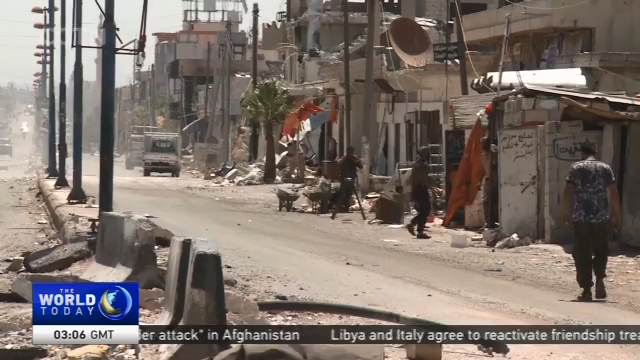
11:58, 08-Jul-2018
Syria Crisis: Government forces recapture border crossing to Jordan
Updated
10:59, 11-Jul-2018
02:23

Syrian government forces have re-captured the main border crossing with Jordan, which was held by rebels for three years. This came after an assault in insurgent territory along the frontier backed by Russian air strikes. CGTN's Alaa Ebrahim went to the border area where Syrian families have started to return.
It has been three years since these Syrian army units have been able to travel here. It was May 2015 when rebels took control of the Nasib border crossing with Jordan. But a lot has changed. Russia became involved in the conflict, and the Syrian army was able to regain control of most of the country and now its borders. The Syrian army entered the crossing this week after Russia brokered a deal with the rebels. The agreement allows militants wanting to leave a safe way out. It also allows safe passage for them and their families to return home. Russian military police have been deployed to guarantee the deal. While the Syrian army is now in control, there were signs the rebels were prepared for a long battle -- this basement, for example, had been turned into weapons storage facility with millions of bullets.
COLONEL YOUNES SYRIAN ARMY "Once we got our orders earlier this month, we launched a military operation. We expected fierce resistance, but we found that the terrorist lines were falling apart. They lost any kind of popular support in the towns they were controlling."
Just outside the Jordanian border is the strategic town of Saida, where rebels had tried to make a last stand.
HOUSAM AZAAIR FIELD COMMANDER, SYRIAN ARMY "We attacked from three different directions, and we were able to take the town after intense fighting. The town is the main link between the western and the eastern countryside of Daraa Province and the supply line into other strongholds. The rest should be very easy."
While Syrian air force helicopters fly low, soldiers on the ground are celebrating the recapture of Daraa Province and an end to two weeks of fierce fighting.
ALAA EBRAHIM DARAA "Once the road to Jordan reopens, many hope that this could open the trade routes that made Syria so much money before the war, at a time when such wealth is needed the most. Alaa Ebrahim - CGTN - Daraa."

SITEMAP
Copyright © 2018 CGTN. Beijing ICP prepared NO.16065310-3
Copyright © 2018 CGTN. Beijing ICP prepared NO.16065310-3